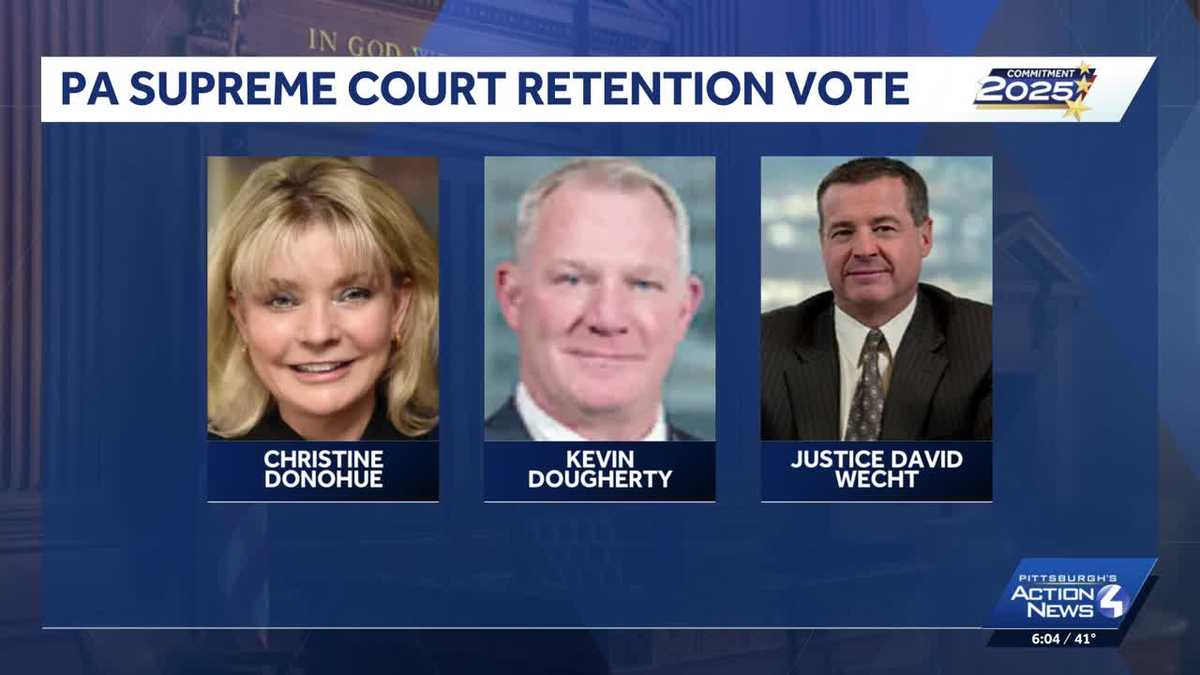Three Pennsylvania Supreme Court justices are campaigning for retention as their 10-year terms come to an end, with voters set to decide their fate on Election Day.VIDEO ABOVE: Voters to decide fate of 3 Pa. Supreme Court justicesPolitical ads have been urging voters to either support or oppose the retention of Justices Christine Donohue, Kevin Dougherty and Wecht, all Democrats.Democrats hold a 5-2 majority on the state Supreme Court, but Republicans have mounted a campaign to oust Donohue, Dougherty and Wecht. If voters decide not to retain a justice for another term, Democratic Gov. Josh Shapiro could appoint a temporary replacement, subject to confirmation by the Republican-controlled state Senate. A deadlock in the confirmation process could result in a court tied at 2-2 if voters oust all three justices this year. If any of these justices are not retained, a partisan election will be held in 2027 to replace them.The last state Supreme Court retention election was in 2017. The Republican justice on the ballot that year was retained with 68% of the vote, while the Democratic justice was retained with 71% of the vote.The retention process stems from a compromise made during a constitutional convention in the 1960s, where Pennsylvania voters agreed on a system that combines partisan elections with a nonpartisan retention vote after 10 years.Pittsburgh’s Action News 4 is committed to bringing you the latest information on Pennsylvania’s general election. The Associated Press contributed to this article.
PITTSBURGH —
Three Pennsylvania Supreme Court justices are campaigning for retention as their 10-year terms come to an end, with voters set to decide their fate on Election Day.
VIDEO ABOVE: Voters to decide fate of 3 Pa. Supreme Court justices
Political ads have been urging voters to either support or oppose the retention of Justices Christine Donohue, Kevin Dougherty and Wecht, all Democrats.
Democrats hold a 5-2 majority on the state Supreme Court, but Republicans have mounted a campaign to oust Donohue, Dougherty and Wecht. If voters decide not to retain a justice for another term, Democratic Gov. Josh Shapiro could appoint a temporary replacement, subject to confirmation by the Republican-controlled state Senate. A deadlock in the confirmation process could result in a court tied at 2-2 if voters oust all three justices this year.
If any of these justices are not retained, a partisan election will be held in 2027 to replace them.
The last state Supreme Court retention election was in 2017. The Republican justice on the ballot that year was retained with 68% of the vote, while the Democratic justice was retained with 71% of the vote.
The retention process stems from a compromise made during a constitutional convention in the 1960s, where Pennsylvania voters agreed on a system that combines partisan elections with a nonpartisan retention vote after 10 years.
Pittsburgh’s Action News 4 is committed to bringing you the latest information on Pennsylvania’s general election.
The Associated Press contributed to this article.

